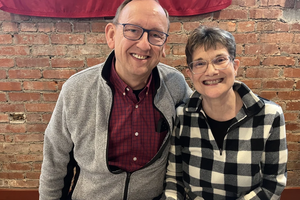Quebec Cardinal: The Eucharist Is the Sacrament of Peace
The COVID-19 pandemic has helped drive home the importance of the Eucharist, Cardinal Gerald Lacroix of Quebec

The COVID-19 pandemic has helped drive home the importance of the Eucharist, Gerald Cardinal Lacroix of Quebec said in a catechesis delivered Tuesday at the 52nd International Eucharistic Congress in Budapest.
“The global pandemic has for months deprived countless people and communities of Eucharistic Bread and the fraternity of gatherings in places of worship,” said Cardinal Lacroix in “The Eucharist: An Inexhaustible Source of Peace and Reconciliation,” a Sept. 7 talk.
This “Eucharistic fasting,” he said, “was felt most harshly by the ones who had never before experienced such a situation and couldn’t forecast its length.”
And while “sorrowful spirits could have evoked Moses’ admonitions” to remind people that they do not live on bread alone, Cardinal Lacroix said this “wasn’t the case in most countries,” including his own archdiocese.
“I can witness that the pandemic is helping us understand the overwhelming power and the infallible presence of the Holy Spirit,” he said.
“Yes, my brothers and sisters, the Word of God resounds with reassuring force in this time of trials. The Spirit of the Risen Christ dwells and acts unceasingly with us, through us and in us. He nourishes us with his grace as he guides our steps, suggests new ways of gathering his people into the Church.”
The Eucharist, Cardinal Lacroix explained, is “the sacrament of peace and reconciliation,” and reception of the Eucharist is an encounter with the source of peace.
“The kind of peace offered by the Eucharist isn’t simply an absence of conflict, but, rather, an active process, one that works towards the reconciliation and healing of persons, families and communities,” he said.
The communal nature of the Eucharist creates “a better world in which peace and reconciliation of all the differences that divide individuals and nations” can come together.
“Living our faith in communion with God is the foundation to a healthy Christian life,” he said. “But learning to live in communion with our brothers and sisters is unavoidable, indispensable, and, let’s face it, quite a challenge!”
By participating in the Eucharist, a person not only encounters the Lord but is exposed to “a school where we learn to love others, to be open to them.”
Without this love for others, he said, true Christianity does not exist.
Cardinal Lacroix drew from his nine years as a missionary in Colombia to illustrate how he was sustained by the Eucharist. In Colombia, Cardinal Lacroix said that it was very dangerous, and he was “overwhelmed by the situation.”
“Praying with the faithful, listening together to the word of God, receiving Holy Communion renewed me, renewed us every day and gave us the strength and courage to continue with our journey,” he said. “Without a personal and community relationship with Jesus, I could not have survived and would most probably have given up and ran away.”
Cardinal Lacroix said that the Lord knew that people would experience hardships, and left humanity the Eucharist in order to “sustain our long walk in this world that leads us to eternal life.” The Eucharist, he said, “prepares us for the mission we are called to carry out.”
“To give us strength and courage on the path of our life, the Lord has left us the sacrament of his Eucharist,” he said.
The cardinal said that “the greatest prize of recognition” that one could confer upon the Eucharist is to let Christ “guide us in all the regions where we ... need his peace,” both in one’s personal life and in “the peripheries of the environments we know.”
Said Cardinal Lacroix, “May you all go in the peace of Christ the Eucharist! You can continue to count on him. He is an inexhaustible source of peace and reconciliation.”
















